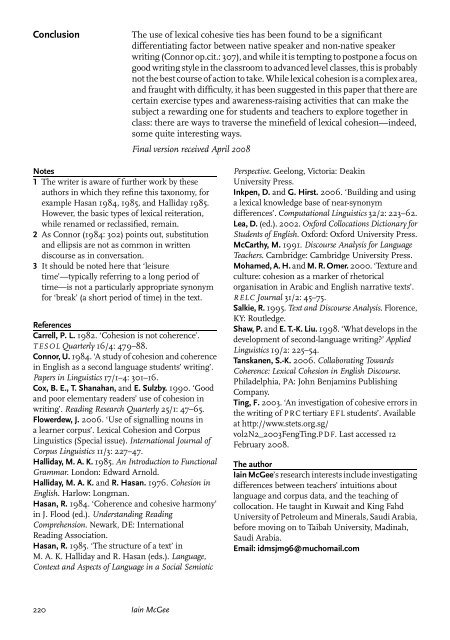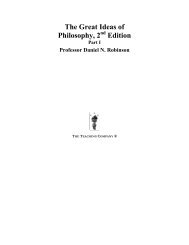Traversing the lexical cohesion minefield
Traversing the lexical cohesion minefield
Traversing the lexical cohesion minefield
You also want an ePaper? Increase the reach of your titles
YUMPU automatically turns print PDFs into web optimized ePapers that Google loves.
ConclusionThe use of <strong>lexical</strong> cohesive ties has been found to be a significantdifferentiating factor between native speaker and non-native speakerwriting (Connor op.cit.: 307), and while it is tempting to postpone a focus ongood writing style in <strong>the</strong> classroom to advanced level classes, this is probablynot <strong>the</strong> best course of action to take. While <strong>lexical</strong> <strong>cohesion</strong> is a complex area,and fraught with difficulty, it has been suggested in this paper that <strong>the</strong>re arecertain exercise types and awareness-raising activities that can make <strong>the</strong>subject a rewarding one for students and teachers to explore toge<strong>the</strong>r inclass: <strong>the</strong>re are ways to traverse <strong>the</strong> <strong>minefield</strong> of <strong>lexical</strong> <strong>cohesion</strong>—indeed,some quite interesting ways.Final version received April 2008Notes1 The writer is aware of fur<strong>the</strong>r work by <strong>the</strong>seauthors in which <strong>the</strong>y refine this taxonomy, forexample Hasan 1984, 1985, and Halliday 1985.However, <strong>the</strong> basic types of <strong>lexical</strong> reiteration,while renamed or reclassified, remain.2 As Connor (1984: 302) points out, substitutionand ellipsis are not as common in writtendiscourse as in conversation.3 It should be noted here that ‘leisuretime’—typically referring to a long period oftime—is not a particularly appropriate synonymfor ‘break’ (a short period of time) in <strong>the</strong> text.ReferencesCarrell, P. L. 1982. ‘Cohesion is not coherence’.TESOL Quarterly 16/4: 479–88.Connor, U. 1984. ‘A study of <strong>cohesion</strong> and coherencein English as a second language students’ writing’.Papers in Linguistics 17/1–4: 301–16.Cox, B. E., T. Shanahan, and E. Sulzby. 1990. ‘Goodand poor elementary readers’ use of <strong>cohesion</strong> inwriting’. Reading Research Quarterly 25/1: 47–65.Flowerdew, J. 2006. ‘Use of signalling nouns ina learner corpus’. Lexical Cohesion and CorpusLinguistics (Special issue). International Journal ofCorpus Linguistics 11/3: 227–47.Halliday, M. A. K. 1985. An Introduction to FunctionalGrammar. London: Edward Arnold.Halliday, M. A. K. and R. Hasan. 1976. Cohesion inEnglish. Harlow: Longman.Hasan, R. 1984. ‘Coherence and cohesive harmony’in J. Flood (ed.). Understanding ReadingComprehension. Newark, DE: InternationalReading Association.Hasan, R. 1985. ‘The structure of a text’ inM. A. K. Halliday and R. Hasan (eds.). Language,Context and Aspects of Language in a Social SemioticPerspective. Geelong, Victoria: DeakinUniversity Press.Inkpen, D. and G. Hirst. 2006. ‘Building and usinga <strong>lexical</strong> knowledge base of near-synonymdifferences’. Computational Linguistics 32/2: 223–62.Lea, D. (ed.). 2002. Oxford Collocations Dictionary forStudents of English. Oxford: Oxford University Press.McCarthy, M. 1991. Discourse Analysis for LanguageTeachers. Cambridge: Cambridge University Press.Mohamed, A. H. and M. R. Omer. 2000. ‘Texture andculture: <strong>cohesion</strong> as a marker of rhetoricalorganisation in Arabic and English narrative texts’.RELC Journal 31/2: 45–75.Salkie, R. 1995. Text and Discourse Analysis.Florence,KY: Routledge.Shaw, P. and E. T.-K. Liu. 1998. ‘What develops in <strong>the</strong>development of second-language writing?’ AppliedLinguistics 19/2: 225–54.Tanskanen, S.-K. 2006. Collaborating TowardsCoherence: Lexical Cohesion in English Discourse.Philadelphia, PA: John Benjamins PublishingCompany.Ting, F. 2003. ‘An investigation of cohesive errors in<strong>the</strong> writing of PRCtertiary EFL students’. Availableat http://www.stets.org.sg/vol2N2_2003FengTing.PDF. Last accessed 12February 2008.The authorIain McGee’s research interests include investigatingdifferences between teachers’ intuitions aboutlanguage and corpus data, and <strong>the</strong> teaching ofcollocation. He taught in Kuwait and King FahdUniversity of Petroleum and Minerals, Saudi Arabia,before moving on to Taibah University, Madinah,Saudi Arabia.Email: idmsjm96@muchomail.com220 Iain McGee














